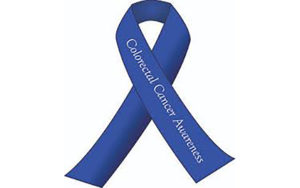 March marks the beginning of National Colorectal Cancer Awareness Month, a time when people across the country join together to advocate for the importance of regular colorectal cancer screenings after age 50. Colorectal cancer is the third most common kind of cancer and the second most common cause of cancer-related death in the United States. The American Cancer Society estimates that about 1 in 22 men and 1 in 24 women in the United States will develop colorectal cancer during their lifetime. Those numbers are alarming, but the good news is that colorectal cancer rates have been falling over the last several years due to advances in diagnosis, screening, and treatment options. One of the best ways to help those numbers drop further is to spread awareness about this deadly disease.
March marks the beginning of National Colorectal Cancer Awareness Month, a time when people across the country join together to advocate for the importance of regular colorectal cancer screenings after age 50. Colorectal cancer is the third most common kind of cancer and the second most common cause of cancer-related death in the United States. The American Cancer Society estimates that about 1 in 22 men and 1 in 24 women in the United States will develop colorectal cancer during their lifetime. Those numbers are alarming, but the good news is that colorectal cancer rates have been falling over the last several years due to advances in diagnosis, screening, and treatment options. One of the best ways to help those numbers drop further is to spread awareness about this deadly disease.
What is colorectal cancer? How does it start? Who is likely to develop it?
Colorectal cancer, also known as bowel cancer, colon cancer, or rectal cancer, is any cancer that starts in the colon or rectum. It affects people in all racial and ethnic groups, and it is most commonly found in people age 50 and up. Adenocarcinomas are cancers that start in the cells that make mucus to keep the inside of the colon and rectum lubricated. When doctors talk about colorectal cancer, they are probably talking about adenocarcinomas, as they make up more than 95% of all colorectal cancers. Other forms of colorectal cancer include carcinoid tumors, gastrointestinal stromal tumors (GISTs), lymphomas, and sarcomas.
Colorectal cancer typically begins as a growth called a polyp on the inner lining of the colon or rectum. There are two types of polyps, adenomatous polyps (adenomas) and hyperplastic or inflammatory polyps. Only adenomas are considered a pre-cancerous hazard, so screening is important to determine which kinds of polyps are present. Colorectal cancer can lead to changes in bowel habits, diarrhea, constipation, a “full bowel” feeling even after a bowel movement, bloody stools, fatigue, weight loss, iron deficiency, and more.
Colorectal cancer is most typically found in people age 50 and older, but it can develop in people of younger age. It is more likely to manifest in individuals with a family history of colorectal cancer or those that have suffered from colorectal cancer or adenomas in the past. Individuals with inflammatory bowel disease (IBD), including ulcerative colitis or Crohn’s disease, have an increased risk of colorectal cancer, particularly if the IBD has gone untreated for long.
How can I help to prevent colorectal cancer?
Get screened early! It is estimated that roughly 6 out of every 10 deaths from colorectal cancer could be prevented if everyone age 50 and older were regularly screened. It usually takes about 10 to 15 years for adenomas to develop into colorectal cancer. Regular screening can ensure that they are removed long before that point. Knowing really is half the battle in this case, so regular screenings after the age of 50 is the best way to prevent colorectal cancer.
Most other preventative measures revolve around lifestyle choices. Obesity and excess belly fat have been linked to increased risk of colorectal cancer, so staying at a healthy weight can help. As is the case for most physical illnesses, increased physical activity levels and healthy diets that are high in fruits and vegetables and low in red and processed meats lower the risk levels for colorectal cancer. Avoiding excess alcohol intake and smoking will also reduce risk for cancer in general.
There is no way to entirely mitigate the risk for colorectal cancer, but living a healthier lifestyle will go a long way to greatly reducing the risk. Think about better lifestyle choices today if you haven’t already, and if you’re over 50 and haven’t been screened lately, get to it! Help us celebrate Colorectal Cancer Awareness Month by sharing this information with your loved ones today.
People who liked this blog also read these:


